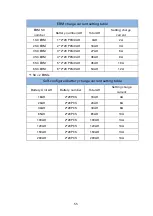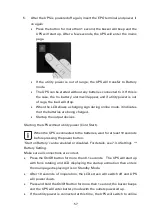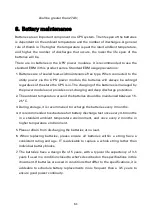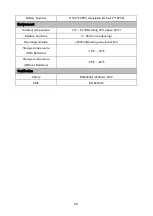
61
shall be greater than 27Ah;
8.
Battery maintenance
Batteries are an important component in a UPS system. The life span of the batteries
is dependant on the ambient temperature and the number of discharges. A general
rule of thumb is: The higher the temperature is past the rated ambient temperature,
and higher the number of discharges that occurs, the lower the life span of the
batteries will be.
There are no batteries in the UPS’ power modules.
It is recommended to use the
standard EBM in this product series. Standard EBM usage precautions:
1. Batteries are of sealed lead-acid maintenance free type. When connected to the
utility power
via the UPS’ power module, the batteries wil
l always be cahregd
regardless of the state the UPS is in. The charging of the batteries is managed by
the power module and provides over-charging and deep discharge protection.
2. The ambient temperature around the batteries should be maintained between 15-
25 ° C.
3. During storage, it is recommened to recharge the batteries every 3 months.
4. It is recommended to schedule a full battery discharge test once every 4-6 months
in a standard ambient temperature environment, and once every 2 months in
higher temperature environment.
5. Please refrain from discharging the batteries at no load.
6. When replacing batteries, please ensure all batteries within a string have a
consistent rating and age. IT is advisable to replace a whole string rather than
individual battery blocks.
7. The batteries have a design life of 5 years, with a typical life expactency of 3-5
years if used in a condition closed to what’s
described on the specifications in this
document. If batteries are used in conditions that differ to the specifications, it is
advisable to schedule battery replacements more frequent than a 3-5 years to
ensure good power continuity.







































